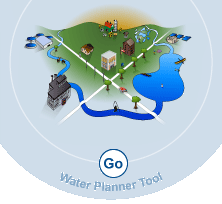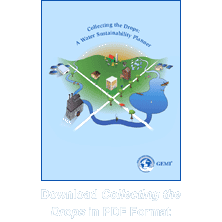|

|
Calculators
Types of Flowmeters
There are many types of flowmeters available for flow measurement applications. This section provides the user with an overview of the types of uses.
Flowmeter selection is based on location, (open pipe versus closed pipe), service (dirty water versus clean water) and accuracy of the flow measurement. The following table summarizes the most common flowmeters on the market today.
Flowmeter Reference Guide
| Flowmeter |
Application |
Service |
| Drum and Stop Watch |
Closed pipe or open channel. |
Simple and inexpensive. Clean or dirty water. |
| Weir |
Open channel v-notch, rectangular or cipolletti weirs. |
Simple and inexpensive. Clean or dirty water. |
| Flume |
Open channel, Parshall, Palmer-Bowlus Flumes. |
Frequently used in sewers and wastewater treatment plants; dirty water. |
| Orifice |
Closed pipe, round flat metal disc plate with specific hole size. |
Clean and dirty water. |
| Venture |
Closed pipe. Section of pipe with tampered entrance straight throat and tampered exit. |
Can be used with most liquids. Clean and dirty water. No moving parts. |
| Positive Displacement |
Closed pipe. Piston gear rotary or disk type meters. |
Clean water applications. Good for low flow measurement. |
| Turbine |
Closed pipe. Flow passes a shedder bar creating vortices. |
Clean and dirty water. |
| Magnetic |
Closed pipe. Magnetic field is created to measure conductive liquid. |
Difficult and corrosive liquids, slurries and sludges. |
| Ultrasonic |
Closed pipe. Doppler and time of travel meters |
Clean and dirty water |
| Mass |
Closed pipe. Coriolis principal meter. |
Clean and dirty water. Mass related processes. Chemical reactions, heat transfer applications. |
| Pitot Tube |
Closed pipe. Pressure sensing taps measure differential pressure |
Clean water. Low cost. Susceptible to plugging. |
Selecting a Flowmeter
The first step in selecting a flow meter is to determine exactly what the meter is supposed to do. The following lists several questions that the user should ask when selecting a meter:
- How accurate of flow measurement is needed?
- Is local or remote indication necessary because the flowmeter will be difficult to access?
- Is the water dirty, viscous or corrosive?
- Is the water conductive?
- What are the operating temperatures?
- Does the existing piping accommodate the flowmeter installation requirements?
It is important to understand the capabilities of the flowmeter you are selecting because each one has different advantages and disadvantages. The flowmeter performance will vary and it may not be necessary to install an expensive flowmeter if only a simple flow measure is needed with little concern for high accuracy. Most suppliers can assist with the right flowmeter for a specific application.
|

|

GEMI
1155 Fifteenth Street, NW,
Suite 500
Washington, DC 20005
Phone: 202-296-7449
Fax: 202-296-7442
info@gemi.org
|
|


